仁爱英语八年级第一学期导学案(U3-U4)
- 格式:doc
- 大小:770.50 KB
- 文档页数:72
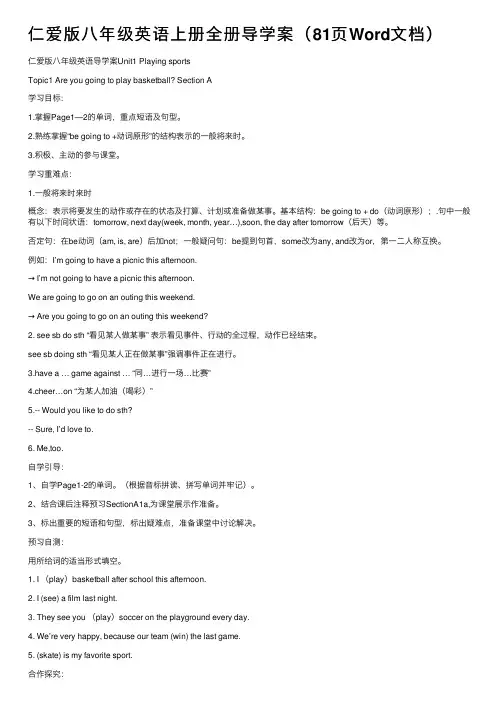
仁爱版⼋年级英语上册全册导学案(81页Word⽂档)仁爱版⼋年级英语导学案Unit1 Playing sportsTopic1 Are you going to play basketball? Section A学习⽬标:1.掌握Page1—2的单词,重点短语及句型。
2.熟练掌握“be going to +动词原形”的结构表⽰的⼀般将来时。
3.积极、主动的参与课堂。
学习重难点:1.⼀般将来时来时概念:表⽰将要发⽣的动作或存在的状态及打算、计划或准备做某事。
基本结构:be going to + do(动词原形);.句中⼀般有以下时间状语:tomorrow, next day(week, month, year…),soon, the day after tomorrow(后天)等。
否定句:在be动词(am, is, are)后加not;⼀般疑问句:be提到句⾸,some改为any, and改为or,第⼀⼆⼈称互换。
例如:I’m going to have a picnic this afternoon.→ I’m not going to have a picnic this afternoon.We are going to go on an outing this weekend.→ Are you going to go on an outing this weekend?2. see sb do sth “看见某⼈做某事” 表⽰看见事件、⾏动的全过程,动作已经结束。
see sb doing sth “看见某⼈正在做某事”强调事件正在进⾏。
3.have a … game against … “同…进⾏⼀场…⽐赛”4.cheer…on “为某⼈加油(喝彩)”5.-- Would you like to do sth?-- Sure, I’d love to.6. Me,too.⾃学引导:1、⾃学Page1-2的单词。
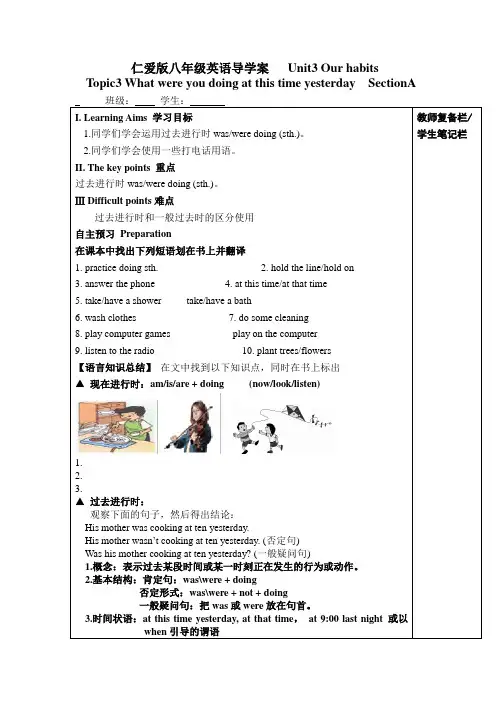
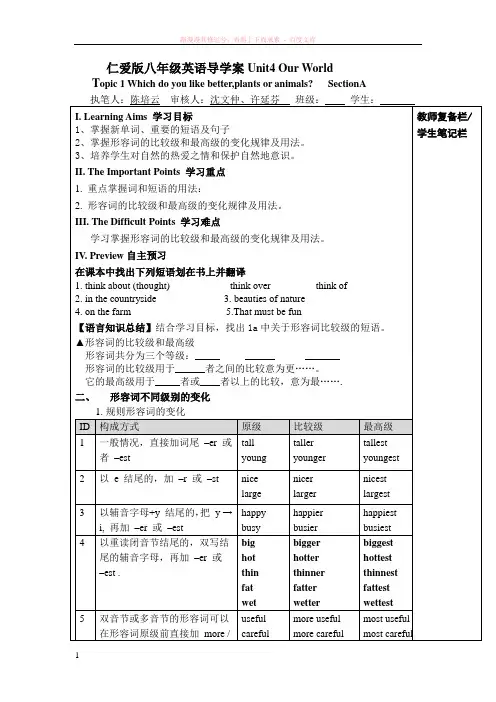
仁爱版八年级英语导学案Unit4 Our WorldT opic 1 Which do you like better,plants or animals? SectionA执笔人:陈培云审核人:沈文仲、许延芬班级:学生:I. Learning Aims学习目标1、掌握新单词、重要的短语及句子2、掌握形容词的比较级和最高级的变化规律及用法。
3、培养学生对自然的热爱之情和保护自然地意识。
II. The Important Points 学习重点1. 重点掌握词和短语的用法:2. 形容词的比较级和最高级的变化规律及用法。
III. The Difficult Points 学习难点学习掌握形容词的比较级和最高级的变化规律及用法。
IV. Preview自主预习在课本中找出下列短语划在书上并翻译1. think about (thought)____________think over ________ think of ___________2. in the countryside _____________3. beauties of nature _________4. on the farm __________________5.That must be fun _________【语言知识总结】结合学习目标,找出1a中关于形容词比较级的短语。
▲形容词的比较级和最高级形容词共分为三个等级:_____ ______ _______形容词的比较级用于______者之间的比较意为更……。
它的最高级用于_____者或____者以上的比较,意为最…….二、形容词不同级别的变化1. 规则形容词的变化ID 构成方式原级比较级最高级1 一般情况,直接加词尾–er 或者–est tallyoungtalleryoungertallestyoungest2 以e 结尾的,加–r 或–st nicelarge nicerlargernicestlargest3 以辅音字母+y 结尾的,把y →i, 再加–er 或–est happybusyhappierbusierhappiestbusiest4 以重读闭音节结尾的,双写结尾的辅音字母,再加–er 或–est . bighotthinfatwetbiggerhotterthinnerfatterwetterbiggesthottestthinnestfattestwettest5 双音节或多音节的形容词可以在形容词原级前直接加more / usefulcarefulmore usefulmore carefulmost usefulmost careful教师复备栏/学生笔记栏less或most / least 构成形容词的比较级和最高级difficultexpensivemore difficultless expensivemost difficultleast expensive2. 不规则形容词的变化ID 原级比较级最高级1 good/well好的better best2 bad/ill坏的/ 病的worse worst3 many/much许多more most4 Little小的/少数一点less least5 far farther更远(表示路程,further更进一步(表示程度)farthest , furthest6 old older更老的/更旧的, elder更年长的oldest , eldest 补充用于不可数名词用于可数名词表示多muchmorethe most many more the most表示少littlelessthe least few fewerthe fewest▲think about 思考、考虑【链接】⑴think over = think about … carefully 仔细考虑…好好想想,你就会有个好主意。
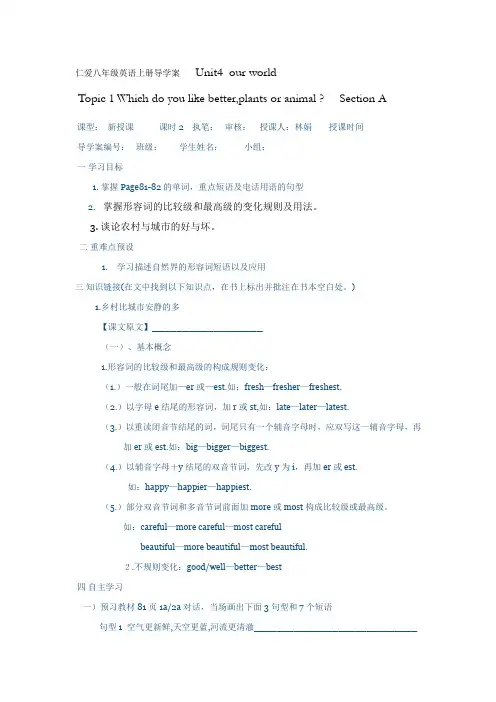
仁爱八年级英语上册导学案Unit4 our worldTopic 1Which do you like better,plants or animal ? Section A课型:新授课课时 2 执笔:审核:授课人:林娟授课时间导学案编号:班级:学生姓名:小组:一学习目标1. 掌握Page81-82的单词,重点短语及电话用语的句型2.掌握形容词的比较级和最高级的变化规则及用法。
3. 谈论农村与城市的好与坏。
二重难点预设1.学习描述自然界的形容词短语以及应用三知识链接(在文中找到以下知识点,在书上标出并批注在书本空白处。
)1.乡村比城市安静的多【课文原文】__________________(一)、基本概念1.形容词的比较级和最高级的构成规则变化:(1.)一般在词尾加—er或—est.如:fresh—fresher—freshest.(2.)以字母e结尾的形容词,加r或st,如:late—later—latest.(3.)以重读闭音节结尾的词,词尾只有一个辅音字母时,应双写这一辅音字母,再加er或est.如:big—bigger—biggest.(4.)以辅音字母+y结尾的双音节词,先改y为i,再加er 或est.如:happy—happier—happiest.(5.)部分双音节词和多音节词前面加more或most构成比较级或最高级。
如:careful—more careful—most carefulbeautiful—more beautiful—most beautiful.2.不规则变化:good/well—better—best四自主学习一)预习教材81页 1a/2a对话,当场画出下面3句型和7个短语句型1 空气更新鲜,天空更蓝,河流更清澈_____________________________句型2 乡村比城市安静的多__________________________句型3 那一定很有趣_______________________________句型4 什么是最强壮的动物___________________________句型5绵阳是他们中最好看的_________________________问: 分别句型1和2表___________________功能用语.二)Section A课堂教学单词之后从中找出下列8个短语,在书上圈下来将其翻译下来。
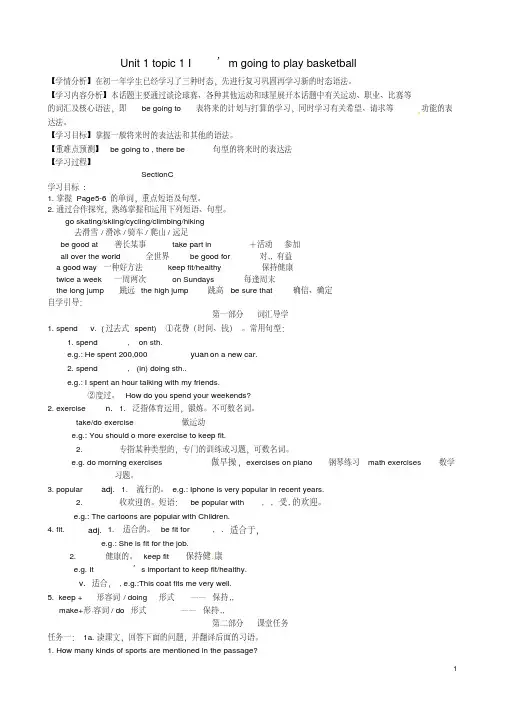
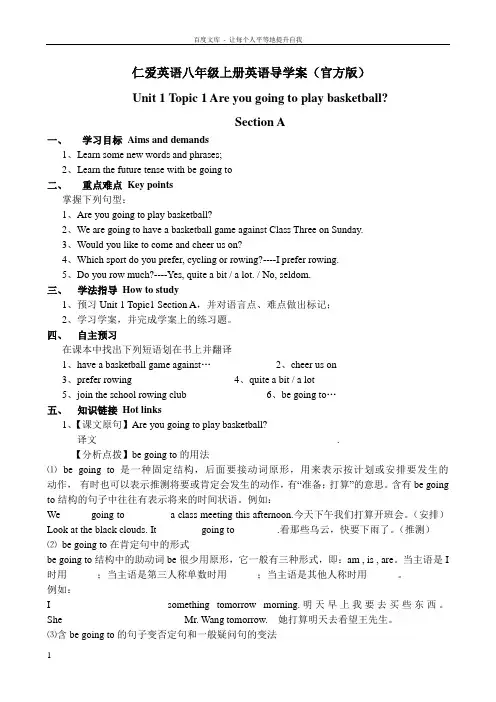
仁爱英语八年级上册英语导学案(官方版)Unit 1 Topic 1 Are you going to play basketball?Section A一、学习目标Aims and demands1、Learn some new words and phrases;2、Learn the future tense with be going to二、重点难点Key points掌握下列句型:1、Are you going to play basketball?2、We are going to have a basketball game against Class Three on Sunday.3、Would you like to come and cheer us on?4、Which sport do you prefer, cycling or rowing?----I prefer rowing.5、Do you row much?----Yes, quite a bit / a lot. / No, seldom.三、学法指导How to study1、预习Unit 1 Topic1 Section A,并对语言点、难点做出标记;2、学习学案,并完成学案上的练习题。
四、自主预习在课本中找出下列短语划在书上并翻译1、have a basketball game against…____________2、cheer us on ______________3、prefer rowing ________________4、quite a bit / a lot____________5、join the school rowing club______________6、be going to…______________五、知识链接Hot links1、【课文原句】Are you going to play basketball?译文________________________________________________.【分析点拨】be going to的用法⑴be going to是一种固定结构,后面要接动词原形,用来表示按计划或安排要发生的动作,有时也可以表示推测将要或肯定会发生的动作,有“准备;打算”的意思。
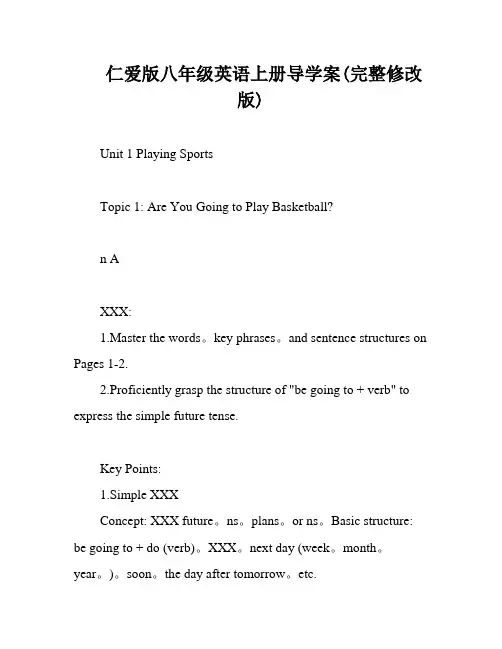
仁爱版八年级英语上册导学案(完整修改版)Unit 1 Playing SportsTopic 1: Are You Going to Play Basketball?n AXXX:1.Master the words。
key phrases。
and sentence structures on Pages 1-2.2.Proficiently grasp the structure of "be going to + verb" to express the simple future tense.Key Points:1.Simple XXXConcept: XXX future。
ns。
plans。
or ns。
Basic structure: be going to + do (verb)。
XXX。
next day (week。
month。
year。
)。
soon。
the day after tomorrow。
etc.Negative form: add "not" after the auxiliary verb "be" (am。
is。
are).General n: move the auxiliary verb "be" to the beginning ofthe sentence。
change "some" to "any," "and" to "or," and swap the first and second person.For example: I'm going to have a XXX.I'm not going to have a XXX.We are going to go on an outing this weekend.Are you going to go on an outing this weekend?2."see sb do sth" means "XXX" and refers to the entire process of the event or n that has already ended.XXX" emphasizes that the event is XXX.3."have a。
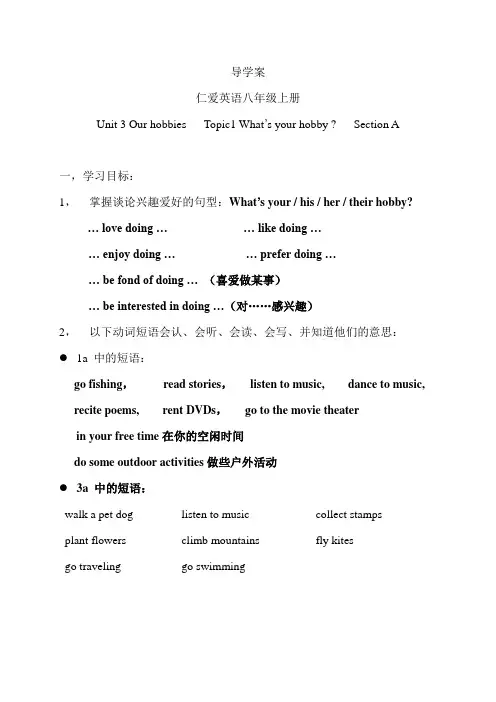
导学案仁爱英语八年级上册Unit 3 Our hobbies Topic1 What’s your hobby ? Section A一,学习目标:1,掌握谈论兴趣爱好的句型:What’s your / his / her / their hobby?… love doing …… like doing …… enjoy doing … … prefer doing …… be fond of doing …(喜爱做某事)… be interested in doing …(对……感兴趣)2,以下动词短语会认、会听、会读、会写、并知道他们的意思:●1a 中的短语:go fishing,read stories,listen to music, dance to music, recite poems, rent DVDs,go to the movie theaterin your free time在你的空闲时间do some outdoor activities做些户外活动●3a 中的短语:walk a pet dog listen to music collect stampsplant flowers climb mountains fly kitesgo traveling go swimming二,达成目标:◆用我们学过的句型,两人一组进行对话,先互问对方的兴趣爱好,再谈论上图康康等四人的兴趣爱好。
(小组比赛,表演对话加2分)A: Wh at’s your hobby?B: I am interested in……/I am fond of……/ I like / love / prefer / enjoy……A: What’s Kangkang’s hobby? He……◆第56页,图2,看图片,听录音,完成以下句子。
1. I love________ and playing the guitar.2. I am interested in __________________.3. I enjoy _______ to music.4. I like _________.5. I like _________poems.6. I am fond of _______ .7. I prefer ____________.◆第55页,1c, 听录音后,看图互问互答式谈论海伦和温伟的兴趣爱好。
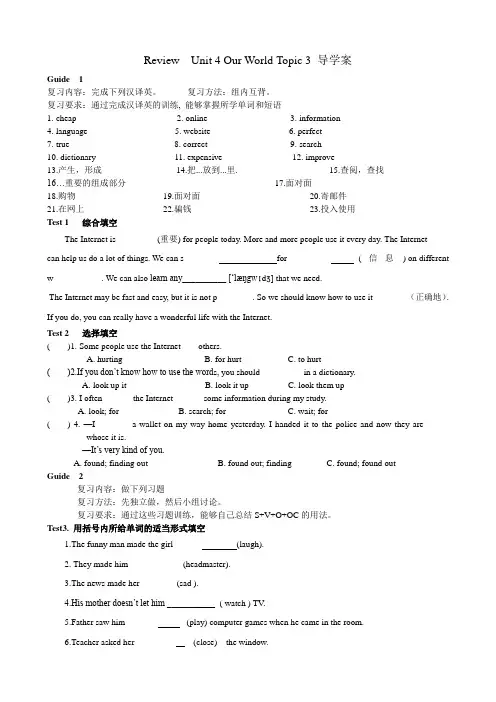
Review Unit 4 Our World Topic 3 导学案Guide 1复习内容:完成下列汉译英。
复习方法:组内互背。
复习要求:通过完成汉译英的训练, 能够掌握所学单词和短语1. cheap2. online3. information4. language5. website6. perfect7. true 8. correct 9. search10. dictionary 11. expensive 12. improve13.产生,形成14.把...放到...里. 15.查阅,查找16…重要的组成部分17.面对面18.购物19.面对面20.寄邮件21.在网上22.骗钱23.投入使用Test 1 综合填空The Internet is _________(重要) for people today. More and more people use it every day. The Internetcan help us do a lot of things. We can s________ for__________ _(信息 ) on different w___________. We can also learn any__________ [‘læŋgwɪdʒ] that we need.The Internet may be fast and easy, but it is not p________. So we should know how to use it ________(正确地). If you do, you can really have a wonderful life with the Internet.Test 2 选择填空( )1. Some people use the Internet ___ others.A. hurtingB. for hurtC. to hurt( )2.If you don’t know how to use the word s, you should _________ in a dictionary.A. look up itB. look it upC. look them up( )3. I often ______ the Internet ______ some information during my study.A. look; forB. search; forC. wait; for( ) 4. —I _______ a wallet on my way home yesterday. I handed it to the police and now they are _____ whose it is.—It’s very kind of you.A. found; finding outB. found out; findingC. found; found outGuide 2复习内容:做下列习题复习方法:先独立做,然后小组讨论。
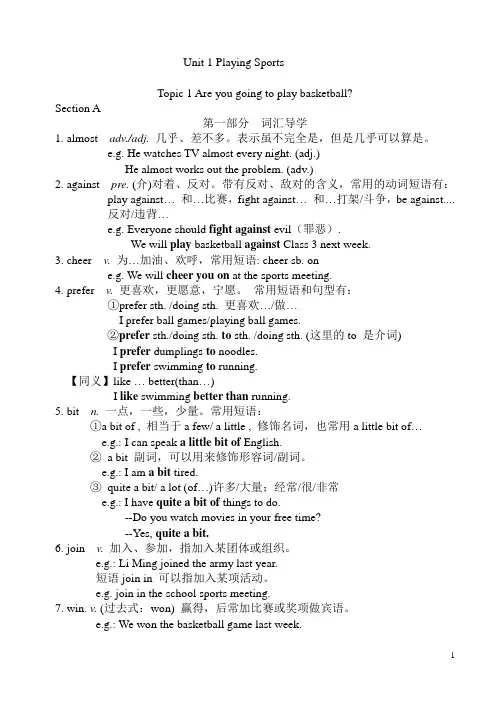
Unit 1 Playing SportsTopic 1 Are you going to play basketball?Section A第一部分词汇导学1. almost adv./adj. 几乎、差不多。
表示虽不完全是,但是几乎可以算是。
e.g. He watches TV almost every night. (adj.)He almost works out the problem. (adv.)2. against pre. (介)对着、反对。
带有反对、敌对的含义,常用的动词短语有:play against…和…比赛,fight against…和…打架/斗争,be against....反对/违背…e.g. Everyone should fight against evil(罪恶).We will play basketball against Class 3 next week.3. cheer v.为…加油、欢呼,常用短语: cheer sb. one.g. We will cheer you on at the sports meeting.4. prefer v. 更喜欢,更愿意,宁愿。
常用短语和句型有:①prefer sth. /doing sth. 更喜欢…/做…I prefer ball games/playing ball games.②prefer sth./doing sth. to sth. /doing sth. (这里的to 是介词)I prefer dumplings to noodles.I prefer swimming to running.【同义】like … better(than…)I like swimming better than running.5. bit n.一点,一些,少量。
常用短语:①a bit of , 相当于a few/ a little , 修饰名词,也常用a little bit of…e.g.: I can speak a little bit of English.②a bit 副词,可以用来修饰形容词/副词。
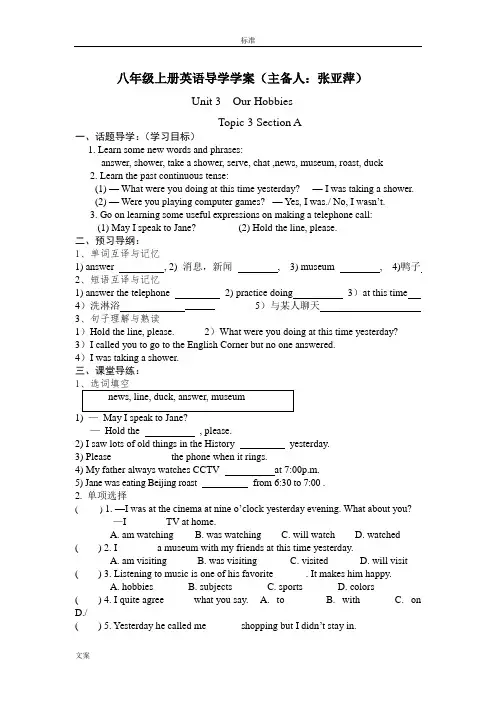
八年级上册英语导学学案(主备人:张亚萍)Unit 3 Our HobbiesTopic 3 Section A一、话题导学:(学习目标)1. Learn some new words and phrases:answer, shower, take a shower, serve, chat ,news, museum, roast, duck2. Learn the past continuous tense:(1) — What were you doing at this time yesterday? — I was taking a shower.(2) — Were you playing computer games? — Yes, I was./ No, I wasn’t.3. Go on learning some useful expressions on making a telephone call:(1) May I speak to Jane? (2) Hold the line, please.二、预习导纲:1、单词互译与记忆1) answer , 2) 消息,新闻, 3) museum , 4)鸭子2、短语互译与记忆1) answer the telephone 2) practice doing 3)at this time 4)洗淋浴 ______ 5)与某人聊天3、句子理解与熟读1)Hold the line, please. 2)What were you doing at this time yesterday?3)I called you to go to the English Corner but no one answered.4)I was taking a shower.三、课堂导练:1—Hold the , please.2) I saw lots of old things in the History yesterday.3) Please ___________ the phone when it rings.4) My father always watches CCTV at 7:00p.m.5) Jane was eating Beijing roast from 6:30 to 7:00 .2.单项选择( ) 1. —I was at the cinema at nine o’clock yesterday evening. What about you?—I _______ TV at home.A. am watchingB. was watchingC. will watchD. watched ( ) 2. I _______ a museum with my friends at this time yesterday.A. am visitingB. was visitingC. visitedD. will visit ( ) 3. Listening to music is one of his favorite ______. It makes him happy.A. hobbiesB. subjectsC. sportsD. colors( ) 4. I quite agree _____ what you say. A. to B. with C. on D./( ) 5. Yesterday he called me ______ shopping but I didn’t stay in.A. goingB. to goC. wentD. goes四、复习自测:补全对话( The telephone rings while Jane is practicing the violin.)Jane’s mother:Hello !Maria: Hello ! 1 . May I speak to Jane ?Jane’s mother : 2( Jane answers the telephone.)Jane: Hello , Maria!Maria: Hello ! 3Jane: I’m practicing the violin.Maria: What were you doing at this time yesterday? 4Maria:1. ___________2.______________3.____________4. _______________5.______________五、课文解读:1. Hold the line, please. 请别挂断电话。
秋季仁爱版英语八年级上册T o p i c导学案集团标准化小组:[VVOPPT-JOPP28-JPPTL98-LOPPNN]Unit 4 Topic 3 The Internet makes the world smaller.Section A【学习目标】:1. 了解因特网的历史及其在人们生活、工作中的重要作用。
2. 学会运用简单句中的“主语+动词+宾语+宾语补足语”的结构。
【重点难点】Key points 掌握下列句型:(1) I can also chat with my grandmother face to face.(2) The Internet makes the world smaller.(3) A special language makes computers talk with each other.(4) How does it work?The Difficult Points 学习难点:“主语+动词+宾语+宾语补足语”的结构【学法指导】 How to study1. 认真阅读Unit4 Topic3 Section A,并对语言点、难点做出标记;2. 学习学案,并完成学案上的练习题;【教学过程】一、预习,翻译下列单词短语。
cheap _______ information __________ language _________ chat on line ___________ face to face ___________ come into being ___________ make it into use______________二、小谈网络对生活的影响,引入话题,导入课文。
三、学习对话1a【分析点拨】1. and so on “等等”,用于句末,表示同类的事物还有很多。
2. face to face “面对面地”类似的结构:neck and neck 齐头并进 hand in hand 手拉手 back to back 背靠背3. The Internet makes the world smaller.这个句子的结构如下:The Internet makes the world smaller.主语谓语宾语宾语补足语宾语补足语可用名词、形容词、副词、动词不定式、动名词、介词短语来表示,如:We made him monitor. 我们选他做班长。
Unit3 Topic1SectionA一. Learning Aims 学习目标1. 会用prefer, like, love, enjoy, be interested in, be fond of 表达喜好。
2. 会用简单的语言形式谈论个人的兴趣爱好。
二、. 自主预习PrepⅠ. .在课本中找出下列短语划在书上并翻译1.在你的空闲时间________________2.去钓鱼______________________3.喜欢听音乐____________________4.喜欢看故事__________________5.喜欢背诗______________________6.租碟_______________________7.去电影院_______________________8.做户外运动________________9.需要改变一下____________________10.遛狗_____________________ 11.徒步旅行_______________________Ⅱ.用六种不同的方式翻译“我喜欢听音乐”。
1.__________________________2.______________________________3.__________________________4._______________________________5.___________________________6.______________________________Ⅲ.请同学们掌握下列句型:(1) I am interested in playing basketball.我对打篮球感兴趣。
(2) I love singing and playing the guitar.我喜欢唱歌和弹吉他。
(3) I enjoy dancing to music.我喜欢跟着音乐跳舞。
Unit4 Our World Topic 3 Section A一、话题导学:(学习目标)1.Learn some new words:Cheap, online, language, information, face to face2.Talk about what we can do on the Internet.---What can you do online?---I can find information, send emails, listen to music, watch movies and so on.b5E2RGbCAP 3. Learn the structure“ S + V + O + OC” (主语+谓语+宾语+宾语补足语).p1EanqFDPw1) let/make sb. do sth. make sb./sth. adj. make sb. n.DXDiTa9E3d2)keep sb./sth adj.3)see sb. doing/do sth.4)ask sb. to do sth5)help sb. (to) do sth.The Internet makes the world smaller.It also helps us to find information much faster.二、预习导纲:1、单词互译与记忆1) cheap, 2) information, 3) online,4) language5) headmaster ____________RTCrpUDGiT2、短语互译与记忆1) come into being 2) chat with3) what else 4) 当面5) 在二十世纪九十年月6) 愈来愈重要 _________________ 7) 使世界变得更小8) 叫某人做某事 ________________5PCzVD7HxAjLBHrnAILg xHAQX74J0X3、句子理解与熟读1)What else can you do online?2)The Internet makes the world smaller.3) I ’m sure the Internet will become more and more important to us.LDAYtRyKfE4) It also helps us to find information much faster.Zzz6ZB2Ltk三、讲堂导练:1、选词填空face to face,chat with,come into being,more and moreimportant, else,information1) The club ___________________________ in 2010.2) Who _________ did you ___________________ online last night? dvzfvkwMI13) I ’ m sure the Internet will become _________________________ to us. rqyn14ZNXI4) You can find the _________________ you need on the Internet. EmxvxOtOco5) Maybe it will be better to talk with your mother ____________________. SixE2yXPq52.单项选择。
八年级上册英语导学学案Unit 3 Topic 3 What were you doing at this time yesterday?Section A一、学习目标1. Learn the past continuous tense.2. Review the expressions of making a phone call.二、重点难点(1) –What were you doing at this time yesterday?–I was taking a shower.(2) – What were you doing from seven to nine yesterday morning?–I was learning English.(3) –Were you playing computer games?– Yes, I was. / No, I wasn’t.三、自主预习Ⅰ.在课本中找出下列短语、句子划在书上并翻译1.等一会儿__________2. 练习小提琴__________3.英语角____________4.洗澡______________5.接电话______________句子:1.我是Maria请讲。
_______________________________2.请等一会。
_______________________________3.昨天的这个时候你在做什么?___________________________4.我正在洗澡_______________________________四、合作交流完成71页1C1.过去进行时由be动词的_______加动词________构成。
过去进行时主要表示过去某个时刻或过去一段时间正在进行的动作。
过去进行时常与表示过去的时间状语如then, at that time, this time of yesterday, a moment age 等连用,或者用另一动作来表示过去的时间。
范县濮城镇中学导学案八年级英语上活页导学案导学案总编号59主备人南红霞审核人赵福华审批人授课人授课时间班级姓名小组课题Unit 4 Topic 3 Section A 课型探究课课时复习辨析:look for :_________________________________Find :____________________________________-3.I’m sure the Internet will become more and more important to us.……对……来说变得更重要。
(作文金句)翻译:________________________________________4.It is very pleasant!非常令人愉快语法:pleasant是形容词,“令人愉快的”Pleasure 是名词,“愉快”eg. It’s a ___________trip.(pleasure)eg.She takes ____________in reading.(pleasure)eg.He did it to please his parents.翻译:_______________________________________三、根据2编写对话四、做练习册单项选择总结反思:学法指导栏学习目标1.记熟本部分单词和短语2.灵活运用重点语法和句式3.背诵本部分的重点段落学习重点pleasant的用法学习难点find out的用法教师“复备栏”或学生“笔记栏”【学习流程】一、短语挑战记忆力(1)在网上________________ (2)更便宜点__________________(3)发邮件_____________ (4)面对面___________________(5)互相对话_____________ (6)谈论_______________(7)关窗户____________ (8)看书___________________二、美句赏析1.I can also chat with my grandmother face to face.翻译;_________________________________________语法:face to face 面对面,类似的还有:①neck and neck 齐头并进②hand in hand手拉手③back to back 背靠背1.Mm,let me find out the informati on line.翻译:_________________________________________________________语法:find out “查明,弄清楚情况”eg.Please help me to find out what time the train leaves.拓展:主语+ find + it +形容词 + to do sth .某人发现做某事……其相当于:It’s + 形容词 + for sb to do sth 做某事对某人来说…… Eg. It’s important for me to learn English well.= ____________________________________________________仿写:________________________________________________=________________________________________________。
Unit 3 Topic 1 Section A What are your hobbies?I. Learning Aims 学习目标1. 同学们会用prefer, like, love, enjoy, be interested in, be fond of 表达喜好。
2. 同学们会用简单的语言形式谈论个人的兴趣爱好。
II. The Key Points 重点1. 重点掌握下列词及短语的写法、读法及用法|:collect收集;value价值; hobby爱好; stone石头; doll玩具; coin硬币; act表演/条列; novel 小说;used to do sth过去常常做某事; be interested in对……感兴趣; be fond of喜欢2. 请同学们掌握下列句型:(1) I am interested in playing basketball.我对打篮球感兴趣。
(2) I love singing and playing the guitar.我喜欢唱歌和弹吉他。
(3) I enjoy dancing to music.我喜欢跟着音乐跳舞。
(4) I like reciting poems.我喜欢朗诵诗歌。
(5) I am fond of acting.我喜欢表演。
(6) I prefer playing soccer.我更喜欢踢足球。
(7) —What are your hobbies?你的爱好是什么?—I used to enjoy listening to rock music, but now I love collecting paintings and telephonecards.我曾经喜欢听摇滚,但是现在我喜欢收集油画和电话卡。
(8) —What do you love collecting?你喜欢收集什么?—I love collecting …我喜欢收集……—Why do you like collecting them?你为什么喜欢收集它们?—Because …因为……(9) Pleased to see you!见到你很高兴!(10) Collecting stamps must be fun!集邮一定很有趣!III. Preview自主预习1. 请同学们认读生词表中P53-54词汇五遍,直至读熟。
若有词读不准,请标出来。
2. 请同学们从Section A中划出含有下列单词的短语并理解Section A:pleased; learn; value; interested; fond3. 仔细阅读1a,用自己的语言概述Michael 和Maria爱好,准备在课堂上展示。
4. 请同学们熟读2a中的句子并尝试将其背会。
5. 根据1c提供的句型与同桌编一组对话,准备课堂上展示。
IV. Hot links知识链接1. be pleased to do 很乐意,高兴做某事pleased adj. 高兴的,满意的Pleased to see you! 相当于Glad/ Nice to see you!【拓展】be pleased with sth/sb 对某事/某人满意如:She is pleased with her new dress. 她很满意她的新裙子。
操练:我很乐意帮助你。
I’m _____/ _____ _____ help you.我的老师以前很满意我的发型。
My teacher _____ _____ _____ _____ hair cut.孩子们很乐意从大人那里得到压岁钱。
Kids are pleased _____ _____ lucky money _____ the old.2. must 意为“必须”,表推测时,意为“一定,肯定”。
如:She isn’t in her bedroom. She must be in her study. 她不在卧室,一定在书房。
You must be careful when you cross the road.过马路时,你必须小心。
【拓展】can't表示否定的猜测,意为‖不可能‖.过去式用couldn't。
操练:他一定是康康的爸爸。
He _____ _____ ______ ______.This bag _____ _____ his. His things are in it. (can’t be; must be)3. be fond of 喜欢,喜爱. be fond of 后面常跟名词,代词和动名词做宾语,操练:我很喜欢吃肉。
I am fond of ______( eat ) meat.她很喜欢读书,所以经常去学校图书馆。
She ____fond of books, so she often _____ _____the school library when she was young. V. Having a Quit.当堂检测(I) 根据句意及首字母提示, 补全单词。
1.---Hi, Larry!P_____ to see you again.---Me, too.2 ---What are your h_____?---I used to travel, but now I collect telephone cards.3. Li Ming has a lot of valuable c_____.4. There is a table in my house. It’s made of s_____.5. I am i______ in basketball.(II) 根据汉语提示补充句子。
1. My brother _____ ____ _____fishing, but I am fond of running.(喜欢)2. Children can _____ a lot about special moments _____ stamps.(从……了解)3. They often sing English songs after school, but I enjoy _____ the guitar.(弹奏)4. I _____ _____ _____ playing computer games, but now I never do it.(对……感兴趣)5. I _____ tea _____ coffee, because tea is better for our health.(比起……更喜欢……) (III)单项选择。
( ) 1. — Which does your brother prefer, singing or dancing?— I think he ___ singing ___ dancing.A. prefer; toB. prefers; toC. like; toD. likes; to( ) 2. — What kind of sports do you like?— I am interested in soccer. 能代替划线部分的是______.A. be fond ofB. enjoysC. don’t likeD. am fond of( ) 3. Our math teacher is very kind to us and often helps us ___ math after class.A. studyB. studiesC. studyingD. studied( ) 4. If a student enjoys ___ computer games, he must do badly in his study.A. playB. playedC. to playD. playing( ) 5. Many young people like dancing _____ music in their spare time.A. withB. toC. forD. in( ) 6. —Why do you like _____?— I think it is great fun.A. actB. actsC. actionD. acting( ) 7. _____ kites is my hobby, because they are beautiful.A. CollectB. To collectC. CollectingD. Collection( ) 8. — _____ do you love _____?—I love collecting model planes.A. Which; collectB. What things; collectC. Which things; collectD. What; collectingVI. Homework课后作业1. 认真读、背今天的―学习重点‖ 和―知识链接‖,并默写。
2. 熟读1a,2a.并背诵,默写一遍。
3. 用上prefer, like, love, enjoy, be interested in, be fond of调查班上的几名同学的―个人兴趣爱好‖。
3. 按Section B中自主预习部分的要求,预习Section B.4. 完形填空。
What do you do at the weekend? Some people like to 1 at home, but others like to go 2 a walk or play football. My friend Jack works hard in a factory during the 3 .At the weekend, he always 4 the same things. On Saturday he 5 his car and on 6 he goes with his family to a village by car. His uncle and aunt have a farm there. It isn’t a7 one but there’s always8 to do on the farm. The children help with the animals and give them their ____9____. Jack and his wife help in the fields(田地). At the end of the day, they are all ___10___and Jack’s aunt gives them a big meal.( ) 1. A. play B. live C. stay D. enjoy( ) 2. A. to B. for C. in D. at( ) 3. A. day B. time C. autumn D. week( ) 4. A. does B. makes C. borrows D. has( ) 5. A. watches B. drives C. sells D. washes( ) 6. A. Monday B. Sunday C. Saturday D. Wendsday( ) 7. A. small B. big C. hard D. short( ) 8. A. much B. little C. fast D. far( ) 9. A. clothes B. places C. food D. water( ) 10. A. clean B. late C. hungry D. friendly5. 阅读理解。